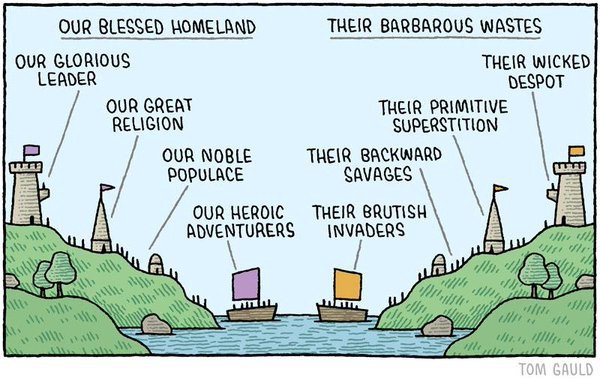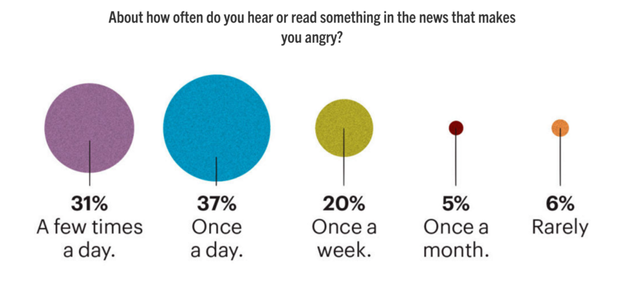The “Other Side” Is Not Dumb
There’s a fun game I like to play in a group of trusted friends called “Controversial Opinion.” The rules are simple: Don’t talk about what was shared during Controversial Opinion afterward and you aren’t allowed to “argue” — only to ask questions about why that person feels that way. Opinions can range from “I think James Bond movies are overrated” to “I think Donald Trump would make a excellent president.”Usually, someone responds to an opinion with, “Oh my god! I had no idea you were one of those people!” Which is really another way of saying “I thought you were on my team!”
In psychology, the idea that everyone is like us is called the “false-consensus bias.” This bias often manifests itself when we see TV ratings (“Who the hell are all these people that watch NCIS?”) or in politics (“Everyone I know is for stricter gun control! Who are these backwards rubes that disagree?!”) or polls (“Who are these people voting for Ben Carson?”).
Online it means we can be blindsided by the opinions of our friends or, more broadly, America. Over time, this morphs into a subconscious belief that we and our friends are the sane ones and that there’s a crazy “Other Side” that must be laughed at — an Other Side that just doesn’t “get it,” and is clearly not as intelligent as “us.” But this holier-than-thou social media behavior is counterproductive, it’s self-aggrandizement at the cost of actual nuanced discourse and if we want to consider online discourse productive, we need to move past this. What is emerging is the worst kind of echo chamber, one where those inside are increasingly convinced that everyone shares their world view, that their ranks are growing when they aren’t. It’s like clockwork: an event happens and then your social media circle is shocked when a non-social media peer group public reacts to news in an unexpected way. They then mock the Other Side for being “out of touch” or “dumb.”
What is emerging is the worst kind of echo chamber, one where those inside are increasingly convinced that everyone shares their world view, that their ranks are growing when they aren’t. It’s like clockwork: an event happens and then your social media circle is shocked when a non-social media peer group public reacts to news in an unexpected way. They then mock the Other Side for being “out of touch” or “dumb.”
Fredrik deBoer, one of my favorite writers around, touched on this in his Essay “Getting Past the Coalition of the Cool.” He writes:
[The Internet] encourages people to collapse any distinction between their work life, their social life, and their political life. “Hey, that person who tweets about the TV shows I like also dislikes injustice,” which over time becomes “I can identify an ally by the TV shows they like.” The fact that you can mine a Rihanna video for political content becomes, in that vague internety way, the sense that people who don’t see political content in Rihanna’s music aren’t on your side.
When someone communicates that they are not “on our side” our first reaction is to run away or dismiss them as stupid. To be sure, there are hateful, racist, people not worthy of the small amount of electricity it takes just one of your synapses to fire. I’m instead referencing those who actually believe in an opposing viewpoint of a complicated issue, and do so for genuine, considered reasons. Or at least, for reasons just as good as yours. This is not a “political correctness” issue. It’s a fundamental rejection of the possibility to consider that the people who don’t feel the same way you do might be right. It’s a preference to see the Other Side as a cardboard cut out, and not the complicated individual human beings that they actually are.
This is not a “political correctness” issue. It’s a fundamental rejection of the possibility to consider that the people who don’t feel the same way you do might be right. It’s a preference to see the Other Side as a cardboard cut out, and not the complicated individual human beings that they actually are.
What happens instead of genuine intellectual curiosity is the sharing of Slate or Daily Kos or Fox News or Red State links. Sites that exist almost solely to produce content to be shared so friends can pat each other on the back and mock the Other Side. Look at the Other Side! So dumb and unable to see this the way I do!
Sharing links that mock a caricature of the Other Side isn’t signaling that we’re somehow more informed. It signals that we’d rather be smug assholes than consider alternative views. It signals that we’d much rather show our friends that we’re like them, than try to understand those who are not.
It’s impossible to consider yourself a curious person and participate in social media in this way. We cannot consider ourselves “empathetic” only to turn around and belittle those who don’t agree with us.
On Twitter and Facebook this means we prioritize by sharing stuff that will garner approval of our peers over stuff that’s actually, you know, true. We share stuff that ignores wider realities, selectively shares information, or is just an outright falsehood. The misinformation is so rampant that the Washington Post stopped publishing its internet fact-checking column because people didn’t seem to care if stuff was true.
Where debunking an Internet fake once involved some research, it’s now often as simple as clicking around for an “about” or “disclaimer” page. And where a willingness to believe hoaxes once seemed to come from a place of honest ignorance or misunderstanding, that’s frequently no longer the case. Headlines like “Casey Anthony found dismembered in truck” go viral via old-fashioned schadenfreude — even hate.
…
Institutional distrust is so high right now, and cognitive bias so strong always, that the people who fall for hoax news stories are frequently only interested in consuming information that conforms with their views — even when it’s demonstrably fake.
The solution, as deBoer says, “You have to be willing to sacrifice your carefully curated social performance and be willing to work with people who are not like you.” In other words you have to recognize that the Other Side is made of actual people.
Good article, this seems to be coming up more often. The awareness that we are baricading ourselves in an echo chamber. I think the meteoric rise of social media in insulating people from differing opinions because they can just block someone they disagree with. There's no challenge or discourse.
Posted using Partiko Android